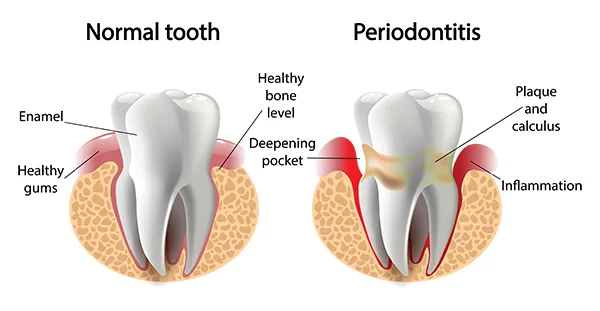Periodontal Care Gum disease can be a very complex and touchy subject. While most of us think it's preferable to not have bleeding gums, canker sores, or bad breath, few of us realize just how it affects our overall health. The connection between gum disease and overall health is very real and needs to be addressed as such. This is because gum disease causes more tooth loss in adults than tooth decay, and the Centers for Disease Control (CDC) estimates that some 47 percent of U.S. adults have it. Thus, it is not surprising that researchers are interested in learning more about its connections to other health conditions. If you are also interested in understanding more about gum disease and overall health, make a point to visit us at Kaw Valley Family Dental. Gum disease can be a very complex and touchy subject. While most of us think it's preferable to not have bleeding gums, canker sores, or bad breath, few of us realize just how it affects our overall health. The connection between gum disease and overall health is very real and needs to be addressed as such. This is because gum disease causes more tooth loss in adults than tooth decay, and the Centers for Disease Control (CDC) estimates that some 47 percent of U.S. adults have it. Thus, it is not surprising that researchers are interested in learning more about its connections to other health conditions. If you are also interested in understanding more about gum disease and overall health, make a point to visit us at Kaw Valley Family Dental. Gum disease is a widespread and extremely common conditionGum disease is a widespread and extremely common condition. It usually begins with a buildup of plaque, a sticky, colorless film that forms on your teeth. If plaque stays on your teeth, it can harden into tartar. Plaque and tartar irritate and inflame the gums. Bacteria in plaque and tartar produce toxins or poisons that make the gums separate from the teeth. This is called periodontal disease. When the bacteria in plaque spreads below the gum line, the body fights back by sending infection-fighting cells to the area. These cells release enzymes that break down the bone and connective tissue holding teeth in place. Gum disease often causes bad breath, also known as halitosis. Apart from that, if left untreated for a long time, gum disease can also cause heart disease. What Are the Stages of Gum Disease?As mentioned earlier, gum disease, or periodontal disease, is a very common dental problem and affects thousands of people. Gum disease can range from mild inflammation to severe damage to the soft tissues and bone that support the teeth. The three stages of gum disease are gingivitis, periodontitis, and advanced periodontitis. Not everyone who has gum disease will progress to the most severe stage and this usually depends on the immediate efforts taken to save the gums from progressing to the most difficult stages. Some of the symptoms you are likely to experience when the disease kicks in are swollen gums, red gums - instead of a healthy pink color, and tender or painful gums. Also, you will be more prone to bleeding when you brush your teeth or floss. How Can You Prevent Gum Disease?These are some tips on how to prevent gum infections or disease. Number one is to brush and floss every day. This is the most important way to keep your teeth and gums clean and healthy. Brush twice a day, especially before going to bed at night. Floss at least once a day. Also use a toothbrush that has soft bristles. The American Dental Association (ADA) recommends using medium or soft toothbrushes for adults. In addition to that, replace your toothbrush when it is worn out. Typically, you should replace your toothbrush every three or four months, or sooner if the bristles are frayed. Never share your toothbrush with anyone else. For more tips ensure you visit us at Kaw Valley Family Dental to get the best gum disease treatment. To book an appointment use 913-441-3373. |